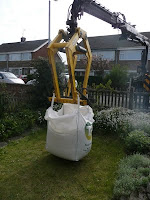
Sarah and I were invited to give a Key Note address at the University of Bradford conference:
The Connected Learner: Distance Learning for the 21st Century last week. Through our networks we had been recommended to speak about our experiences in developing the
MSc Advanced Occupational Therapy programme delivered online from registration to graduation (applications for Sept 09 intake accepted until August 24th 2009).
Whilst being nervous, we were very keen to both share our ideas and learn from the experiences of others.
The first Key note speaker, Palitha Edirisingha from University of Leicester talked of his work in
the media zoo and the work of the
Beyond Distance Research Alliance -. Palitha also referred to Salmon's
5 stage model of elearning which is something I intend to look at more closely in a quiet moment.
We then sat in on a couple of workshops on
Second Life and the use of social networking in learning . As we were not staff at the university we had difficulty getting access to the internet - but it was a useful experience to see how delegates were introduced to Second Life, and the facilitiator,
Will Stewart has kindly offered to share his extremely clear notes and instruction for us to consider using with our second year MSc students as we begin to introduce them to Second Life.
Lunch was very tasty, and we had a chance to chat to a few of the delegates. Sarah's chair nearly landed her in a very embarrasing situation - but luckily she managed to compose herself and the offending bolt from the chair was later found under the table to corroborate her story!
Sarah and I presented to the conference after lunch - potentially the graveyard slot - but we were well received and managed to keep to time. We explored (amongst other things) the importance of
a) the pedagogy informing the technology
b) being a student yourself of the technology before expecting others to engage
c) online identity (more of this soon in another post)
d)
social constructivist approach - and being consistant with this
e) pushing boundaries and challenging self and others
We also shared what we have learned from our developments and what we have still to learn. Whilst there were very few questions immediately after our session, we were asked many at the plenary session. Most centred on how we are using negotiated assessment and the time resource requirements in developing and delivering a totally online programme.
What becomes clear as we network and reflect more about our programme is how innovative we are here at Salford with this MSc. Whilst there are pockets of online teaching and learning developments, very few are delivering whole programmes totally online using elearning principles.
Thanks to everyone who took the time to attend our Key Note address. We have been invited to join a couple of University online networks in
Ning and
Pebblepad - which we are looking forward to being involved in. We have also exchanged contact details with a number of people who are interested in what we are doing and may want to collaborate with us in the future. We are always happy to work with others and share ideas and experiences where relevant.























